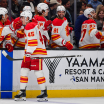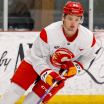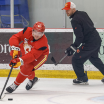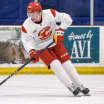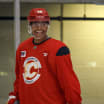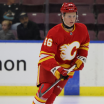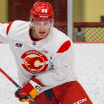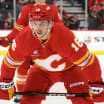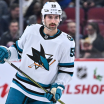The challenges are different.
But the mandate is certainly the same.
Win.
It's what Brad Pascall has done, time and time again, during a lengthy career with Hockey Canada. It's what he wants to do as an assistant general manager with the Calgary Flames.
Pascall took the time before taking off on a scouting trip to sit down with CalgaryFlames.com for a Q&A session that wandered from his first hockey memories, to Hockey Canada dream-teams to the favourite part of his job with the Flames.
Brad Pascall - Q&A
Brad Pascall talks about his time with Hockey Canada and his role with the Calgary Flames
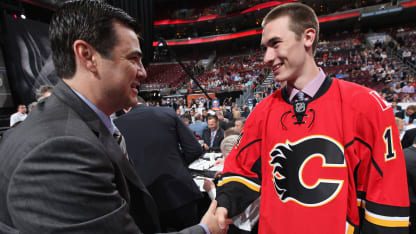
© Dave Sandford/Getty Images
By
Aaron Vickers
NHL.com Independent Correspondent
CALGARYFLAMES.COM: What is your first memory of the game of hockey?
PASCALL: My father (Bernie Pascall) was a broadcaster, so I was around the rink with the Canucks a lot in Vancouver, whether that's going to games or going to practices. That's a hockey memory for me. Secondly watching my brother play. He's four years older than me. Watching him play or practice … to me those are two hockey memories. The last one, like anybody, is watching Hockey Night in Canada on a Saturday night … watching my father broadcast Canucks games on TV. Those three things would be memories of mine at a young age being between 6 and 9, if you will.
CALGARYFLAMES.COM: Did you realize early on that hockey could provide a tangible living for you?
PASCALL:My path is I was around hockey a lot but I didn't start playing hockey until I was nine. In some cases, that's starting late. I didn't really have that desire. I enjoyed watching my brother play and enjoyed being around, but other than skating I didn't really have that. Some of my good buddies at a young age told me to come play. I started playing and enjoyed it. The evolution went that all of a sudden I was playing rep hockey a number of years later and continued a path of playing. For me, at a young age, I wasn't really sure. To have the opportunity to work in hockey, I think, eventually came about as my college slash pro career started winding down. I had to figure out what I wanted to do. I always wanted to be involved in hockey at some level. Turned out I had a successful path.
CALGARYFLAMES.COM: How did you transition from playing, to finding an off-ice career in hockey?
PASCALL: I got my degree in communications and public relations. I always had a desire of working in hockey in a communications role. It's something I enjoyed. I didn't know if it would be in broadcasting or some sort of communications role. It's something I thought about. I'll get off track a bit, but I kind of stumbled upon it. Living in BC and growing up in BC, I was involved at different levels of BC Amateur Hockey and now it's BC Hockey. Under-17 teams and Under-18 teams. Everything's about timing. When my pro career … I was playing in the ECHL at the time … was winding down, I ended up going to Vancouver for a friend's wedding in the summer. I was wondering about what to do and caught wind that Vancouver was opening up their new building downtown and Hockey Canada was putting an office in that building. It was called the 'BC Centre of Excellence.' It was a regional Hockey Canada office working with the Canucks. They were looking to hire somebody. I threw a resume together and put it in. It sounded like a really good fit. I knew Bob Nicholson and knew a lot of people with the Canucks organization. It seemed to be a good fit.
I went through the process and ended up getting the job and it was time for me to stop playing hockey at the minor league level and work in hockey and I jumped at it. I was doing communications and hockey development and doing World Cup stuff in 1996 and doing pre-Olympic events in 1998 and getting to know more and more people in hockey.
CALGARYFLAMES.COM: Could you have imagined where it would take you?
PASCALL: You hope. Once you're in it, you want to continue a path of success and have a strong work ethic and always be willing to learn. I enjoyed it immensely and always wanted to do more and always pushed and asked what I can do more and be involved in different things and different events. I think it was the right path for me as a one-person office for the most part. I traveled all over BC and was involved in running events and clinics and minor hockey programs. It was a good entry into the game as a hockey administrator.
CALGARYFLAMES.COM: Over your career, what Hockey Canada moment stands out most in your mind?
PASCALL:There's a lot. First, the people I got to work with at Hockey Canada are passionate people who love the game and do wonderful things for young players who play the game, with such a desire and passion to win and to be around people like that on a daily basis was excellent.
For a moment … I was fortunate to be a part of a number of gold medal-winning teams. I'd say, probably, the first gold medal that I was with was 2002 in Salt Lake City. That would be first. Another would be part of winning five World Junior gold medals in a row. A third would be an Olympic gold medal in Vancouver, and in Sochi. Those I had different roles in. At Sochi, from a Hockey Canada standpoint, I was the lead person and I was in more of a secondary role in Vancouver. But being my hometown it was special. In Sochi, taking a lead role in that was something special.
On the non-hockey front, one of my proudest moments was being a part of a national ad campaign called, 'Relax, it's just a game.' When I started at Hockey Canada I was involved in Hockey Canada and oversaw the whole wing and gradually moved to a hockey operations role. The 'Relax, it's just a game' campaign that we did on a pro bono basis and got national and international coverage … it was featured on CNN and Oprah … that was something I was really, really proud of.
CALGARYFLAMES.COM: If you could, how would you assemble an all-time starting lineup from different tournaments you were involved in at Hockey Canada?
PASCALL:There's so many great players. It would be hard for me to do it off the top of my head. There's so many guys that I would put on that in the way that answered the bell for Canada. Guys like Ryan Smyth and Shane Doan, Eric Brewer, that in our time there was no question they were coming. Guys like that who had a passion for the game and wanted to represent their country. You look at them. But then, in no disrespect to them as players and Shane's still playing and Ryan had a great career, but all-star players like Mario Lemieux and Wayne Gretzky … Wayne both on and off the ice … Chris Pronger was one of my favourite guys with his passion for the game and his compete and his desire to do everything it takes to win. Another guy, Jay Bouwmeester … him and I seemed to be part of a number of gold medal winning teams. You build those relationships with guys on and off the ice that you win together and you're always going to have that. To pick just six guys with so many different emotions … it'd be really hard for me to do that.
CALGARYFLAMES.COM: What was the biggest eye-opener in your first season with the Calgary Flames?
PASCALL:First and foremost, the desire and the will to do everything you can to build a winning team, a winning culture, that's something that hasn't changed. One of the reasons I thought it was a good fit was that I knew that's what the Calgary Flames were about from ownership all the way down. That was something I wanted to continue to be a part of.
But for key differences, at Hockey Canada you're dealing with always the best players and having the opportunity to put together Olympic teams or World Junior teams that you have access to the best players where if you're building an NHL team or an American League team, you're bound by budgets and cap and not having the ability to put together all-star teams. You're putting together winning teams, but you have limitations compared to at Hockey Canada.
At Hockey Canada, I was really looking at the elite, where with the Flames you're watching all different levels of players, from the American League or whether you're signing guys to AHL deals, AHL-ECHL deals, looking for depth players, looking for shining star players that are out there that maybe didn't get drafted and looking to sign. For me, it was focusing in on a different criteria of players in some regards. You're always looking for the all-star players, and you want to have them on your team, but it's really getting to know players at all different levels in a different light.
CALGARYFLAMES.COM: What's your biggest challenge day-to-day with the Flames?
PASCALL:There's a continual challenge. Learning from Brad Treliving and Brian (Burke) every day … you come to work and Brad comes to work with a passion of, 'How do we get better?' It's a challenge of mine and ours collectively of, 'What can we do to get better?' Is there something we can do to continue to drive success and have success as an organization. Whether that's internally with our staff, if that's communicating with players and coaches, if that's making changes to our roster in the American League or the NHL.
My role is a little bit different from Brad or Brian's. In my day-to-day role, it's working as part of a team, contributing as much as I can, and having a passion to ask and execute on what we can do to be better.
CALGARYFLAMES.COM: What's been your most rewarding day, so far, in your time with the Flames?
PASCALL:Any time you have the opportunity to call one of our American league guys to call them up to the Flames roster is rewarding. Part of my role and responsibility is developing players and developing prospects, and being a part of helping them along to achieve their goal and dreams. Any time you have the opportunity to make that call and get somebody up I think is a reward … and it's not something I take credit for, but you're the gatekeeper of doing that. Our American league coaches and the player himself, and every situation is different … but to be able to call guys and say, 'Hey, you're coming up,' is great. You're on the opposite side where you cut players or send them down.
But you're so excited for the player and their family when they get called up, and hopefully, their contributions to the team can be something that will be effective for everybody.
CALGARYFLAMES.COM: Is there a call that stands out for you?
PASCALL:The first one, my first one, was Josh Jooris. That was pretty cool. To me, that was a fun one. That was the first one. And again, I'm truly the gatekeeper of making that call. There are a lot of other steps and people involved. I wouldn't take credit for him being an NHL player because of it. But being the gatekeeper and having that opportunity to say, 'Hey, you're coming up,' and knowing how excited they are at the other end of the phone is cool.



